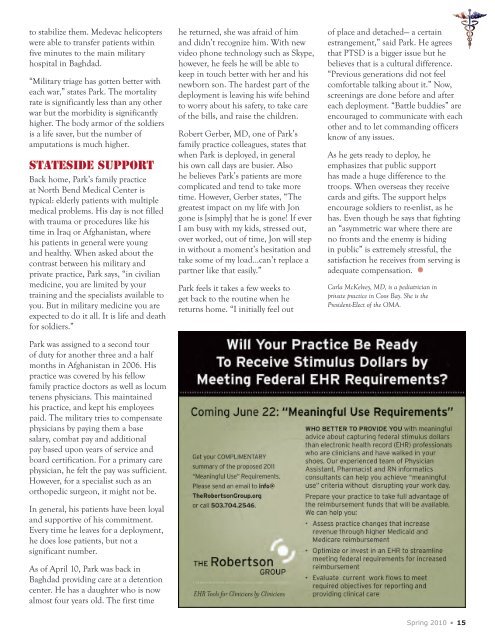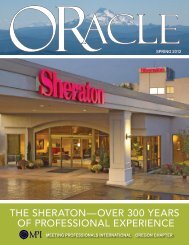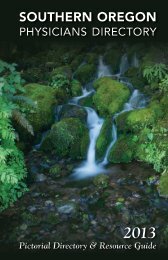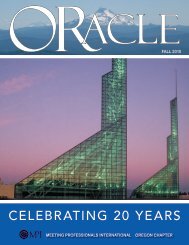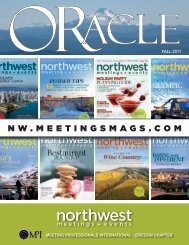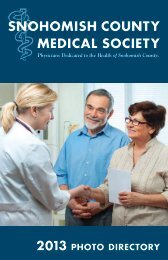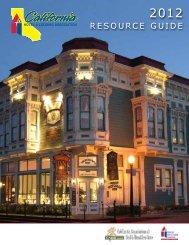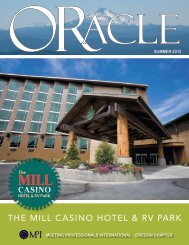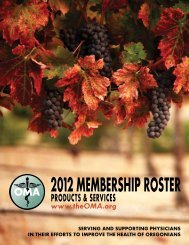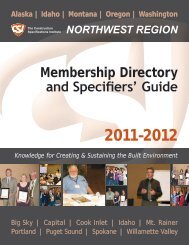The Doctor is Deployed - LLM Publications
The Doctor is Deployed - LLM Publications
The Doctor is Deployed - LLM Publications
You also want an ePaper? Increase the reach of your titles
YUMPU automatically turns print PDFs into web optimized ePapers that Google loves.
to stabilize them. Medevac helicopterswere able to transfer patients withinfive minutes to the main militaryhospital in Baghdad.“Military triage has gotten better witheach war,” states Park. <strong>The</strong> mortalityrate <strong>is</strong> significantly less than any otherwar but the morbidity <strong>is</strong> significantlyhigher. <strong>The</strong> body armor of the soldiers<strong>is</strong> a life saver, but the number ofamputations <strong>is</strong> much higher.Stateside SupportBack home, Park’s family practiceat North Bend Medical Center <strong>is</strong>typical: elderly patients with multiplemedical problems. H<strong>is</strong> day <strong>is</strong> not filledwith trauma or procedures like h<strong>is</strong>time in Iraq or Afghan<strong>is</strong>tan, whereh<strong>is</strong> patients in general were youngand healthy. When asked about thecontrast between h<strong>is</strong> military andprivate practice, Park says, “in civilianmedicine, you are limited by yourtraining and the special<strong>is</strong>ts available toyou. But in military medicine you areexpected to do it all. It <strong>is</strong> life and deathfor soldiers.”Park was assigned to a second tourof duty for another three and a halfmonths in Afghan<strong>is</strong>tan in 2006. H<strong>is</strong>practice was covered by h<strong>is</strong> fellowfamily practice doctors as well as locumtenens physicians. Th<strong>is</strong> maintainedh<strong>is</strong> practice, and kept h<strong>is</strong> employeespaid. <strong>The</strong> military tries to compensatephysicians by paying them a basesalary, combat pay and additionalpay based upon years of service andboard certification. For a primary carephysician, he felt the pay was sufficient.However, for a special<strong>is</strong>t such as anorthopedic surgeon, it might not be.In general, h<strong>is</strong> patients have been loyaland supportive of h<strong>is</strong> commitment.Every time he leaves for a deployment,he does lose patients, but not asignificant number.As of April 10, Park was back inBaghdad providing care at a detentioncenter. He has a daughter who <strong>is</strong> nowalmost four years old. <strong>The</strong> first timehe returned, she was afraid of himand didn’t recognize him. With newvideo phone technology such as Skype,however, he feels he will be able tokeep in touch better with her and h<strong>is</strong>newborn son. <strong>The</strong> hardest part of thedeployment <strong>is</strong> leaving h<strong>is</strong> wife behindto worry about h<strong>is</strong> safety, to take careof the bills, and ra<strong>is</strong>e the children.Robert Gerber, MD, one of Park’sfamily practice colleagues, states thatwhen Park <strong>is</strong> deployed, in generalh<strong>is</strong> own call days are busier. Alsohe believes Park’s patients are morecomplicated and tend to take moretime. However, Gerber states, “<strong>The</strong>greatest impact on my life with Jongone <strong>is</strong> [simply] that he <strong>is</strong> gone! If everI am busy with my kids, stressed out,over worked, out of time, Jon will stepin without a moment’s hesitation andtake some of my load…can’t replace apartner like that easily.”Park feels it takes a few weeks toget back to the routine when hereturns home. “I initially feel outof place and detached— a certainestrangement,” said Park. He agreesthat PTSD <strong>is</strong> a bigger <strong>is</strong>sue but hebelieves that <strong>is</strong> a cultural difference.“Previous generations did not feelcomfortable talking about it.” Now,screenings are done before and aftereach deployment. “Battle buddies” areencouraged to communicate with eachother and to let commanding officersknow of any <strong>is</strong>sues.As he gets ready to deploy, heemphasizes that public supporthas made a huge difference to thetroops. When overseas they receivecards and gifts. <strong>The</strong> support helpsencourage soldiers to re-enl<strong>is</strong>t, as hehas. Even though he says that fightingan “asymmetric war where there areno fronts and the enemy <strong>is</strong> hidingin public” <strong>is</strong> extremely stressful, thesat<strong>is</strong>faction he receives from serving <strong>is</strong>adequate compensation. •Carla McKelvey, MD, <strong>is</strong> a pediatrician inprivate practice in Coos Bay. She <strong>is</strong> thePresident-Elect of the OMA.Spring 2010 • 15


